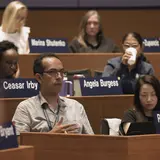Yale School of Management to Expand EMBA Program with Study in Asset Management and Sustainability
The Yale School of Management is expanding its MBA for Executives program by offering students the ability to focus their studies in asset management or sustainability. The program is enrolling students who aspire to lead in these areas for fall 2014.
The Yale School of Management is expanding its MBA for Executives program by offering students the ability to focus their studies in asset management or sustainability. The program is enrolling students who aspire to lead in these areas for fall 2014.
Yale SOM’s MBA for Executives program was launched in 2005 and initially admitted students exclusively from the healthcare sector. The program delivers a rigorous foundation in business skills, as well as in-depth study of a particular industry or sector. The expanded program is part of the school’s planned growth as it moves to a new campus, Edward P. Evans Hall, in January 2014. The expanded EMBA program reflects Yale SOM’s focus on addressing the most complex business challenges in an increasingly global world. Healthcare, asset management, and sustainability are areas in which the school also has deep faculty expertise and the ability to draw on the resources of Yale University to give students a unique understanding of these fields.
“To forward the school’s mission to educate leaders for business and society, I am excited that we are expanding the scope of the Yale SOM MBA for Executives program,” said Edward A. Snyder, dean of the Yale School of Management. “The program will continue to feature our integrated core curriculum and our Leadership Development Program. The new areas of focus—asset management and sustainability—are similar to our existing focus on healthcare in that they deal with big issues at the nexus of business and society. The world needs leaders who understand the importance of managing people’s retirement savings, pension funds, and endowments, or addressing climate change and resource availability in a systematic way.”
The asset management focus will teach students the technical skills of investing as well as an understanding of broader organizational and strategic issues. “A narrow master’s in finance is exactly what this program is not,” said William N. Goetzmann, the Edwin J. Beinecke Professor of Finance and Management Studies and the faculty director for the asset management concentration. “It’s an MBA. The business of asset management demands a complete set of MBA skills. For instance, any asset management company is exquisitely dependent upon selecting people of high integrity to handle investors’ money. How do you find and retain the right people? How do you identify and meet clients’ needs? How should services be priced? In the world of asset management, a firm is constantly dealing with innovations from competitors, as well as the constant drumbeat of changes to information technology and shifting regulatory requirements. Understanding clients’ goals and translating these into effective investment strategies demands engagement, creativity, financial know-how, and responsibility. We've designed our program around this plan.”
The sustainability concentration will focus on applying an integrated, sustainable approach to business as a means of driving innovation and growth in organizations. “For half a century we have dealt with traditional sustainability issues—resource availability, energy, climate change—by thinking about what you cannot do, or what you have to reduce or eliminate,” said Paul Anastas, the Teresa and H. John Heinz III Professor in the Practice of Chemistry for the Environment at the Yale School of Forestry & Environmental Studies, and faculty director of the sustainability concentration. “There has been a transformation to thinking about what you can create, invent, and innovate by aligning sustainability issues with economic drivers and market forces. Now, sustainability, when done right and thoughtfully, is a competitive advantage.”
“The combination of the Yale MBA and in-depth study of healthcare leadership has been a winning formula for our graduates over the past eight years, as evidenced by the impact they are having across the sector,” explained Dr. Howard Forman, professor of diagnostic radiology, economics and management, and faculty director of the healthcare concentration. “Building on this strong foundation by adding asset management and sustainability is very exciting and will no doubt enrich the experience of all students, including those with a healthcare background.”
The curriculum and contact hours for Yale’s EMBA program are identical to that of the full-time MBA program. The EMBA program includes Yale SOM’s unique integrated core curriculum, Leadership Development Program, raw cases, team project work, and emphasis on global business. Students learn a set of fundamental skills and frameworks in the core and in advanced management courses, complemented by advanced sector-specific courses and speaker series that build insight into the issues facing their industry. Classes are taught every other weekend during the 22-month program, allowing participants to continue working and developing practical expertise. For detailed program and application information, please visit: http://som.yale.edu/our-programs/mba-executives.
About the Yale School of Management
The Yale School of Management attracts broad-minded, intellectually curious students and faculty. An integrated curriculum, close ties to Yale University, and an active connection to the Global Network for Advanced Management ensure that Yale MBAs not only acquire crucial technical skills but also develop a genuine understanding of an increasingly complex global context. Yale MBAs assimilate information and ideas from multiple sources, functional areas, and points of view to lead effectively in all regions and sectors. Yale SOM offers a full-time MBA program, as well as an MBA for Executives, Master of Advanced Management, and PhD.



